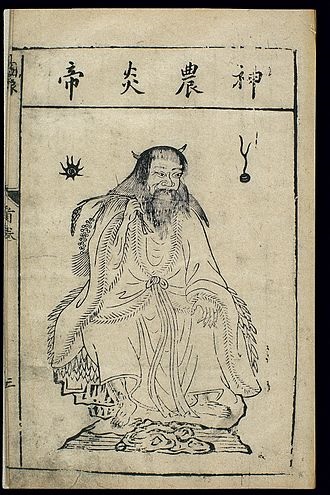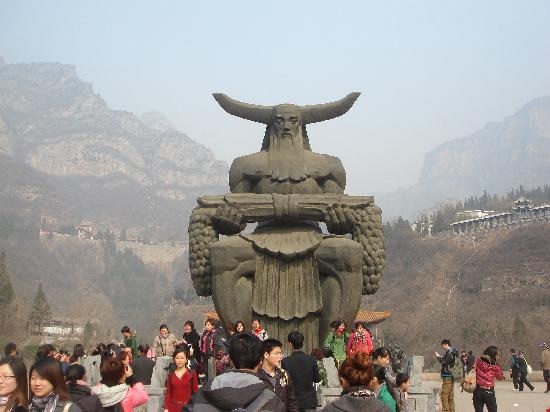(6) Shennong, God of Health
When Shennong (神農) was born eons ago, a phoenix was perching next to his mother giving birth. Legends say that phoenixes chose the best tree to roost. We might understand that Shennong was born in the best of dwellings.
He grew up to be the largest god; not the powerful, but the most contributive to human development and culture. He is remembered today as a Benevolent God.
Shennong had another name, being ruler of his tribe, viz. Yandi (炎帝), King of Fire. He initiated the idea of burning wild plants to make farmland. He also invented the plough and wooden rake to tilt the land for growing grains and vegetables. He changed our diet from eating raw meat, fish and berries to cooked grains and vegetables, making our foods healthier to enhance brain development.
As a robust youth, he ran through his home forest to know the thousands of plants, birds and insects, often taken up the sky by the phoenix. One day, from high in the air, he saw many people vomiting and shitting, crying in pain. They were sick and dying. He decided to heal them.
He got himself sick and began to experiment on various tree leaves to test their medicinal effects. He chewed them and sucked in the juices to experience their tastes and effects. At times, he was poisoned and his body trembled. Other times he felt pain and a burning head. But he always found antidotes, aided by phoenix friends. They could tell what a good tree was. So, Shennong had developed a tea from leaves of five good trees, an effective antidote for poisoning. His experiments were extensive. We have no idea how he recorded his findings, because the written language was not yet invented. But, we have today his signature work, The Summery of One Hundred Herbs. It is the foundation of Chinese medicine. Tragically, he paid his life making it, probably by the accumulated poisons in his body system.
 Various classics have told stories of Shennong, the mythical god and the real man. While these stories covered anecdotes and legendary tales across great spans of time and space, there is agreement that his birthday was the 26th day of the 2nd moon. And, from estimation, his birth place was in Hubei Province, a place now named The Gap of Shennong.
Various classics have told stories of Shennong, the mythical god and the real man. While these stories covered anecdotes and legendary tales across great spans of time and space, there is agreement that his birthday was the 26th day of the 2nd moon. And, from estimation, his birth place was in Hubei Province, a place now named The Gap of Shennong.
He is remembered as one of the three legendary kings of prehistoric China, and one of the two ancestors of the Chinese people, Yandi and Huangdi. Today, regardless of where they are born, or what nationality, ethnic Chinese all over the world are proud to declare they are the descendants of Yandi and Huangdi (炎黃子孫). Every year, tens of thousands of people converge at the Great Temple to pay respect to these mythical god-man creators and heroes.
--------------------------------------------------------------------
Note: This is a narration of passages in《呂氏春秋》and《民間傳說》depicting Shennong as founder of Chinese medicine, including theory of the human body and spirit and the system of diagnosis and treatment of ills and pains. Such a system encompasses eating and activities for people to maintain good health in thousands of years, is now being studied and perfected in medical institutions all over the world. Having a glimce of the life and work of Shennong will help us better understand the Chininese culture, life style and health care.


